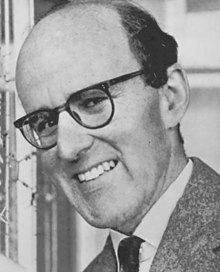
Max Perutz
Austrian-born British molecular biologist (1914–2002) / From Wikipedia, the free encyclopedia
Dear Wikiwand AI, let's keep it short by simply answering these key questions:
Can you list the top facts and stats about Max Perutz?
Summarize this article for a 10 year old
SHOW ALL QUESTIONS
Max Ferdinand Perutz OM CH CBE FRS (19 May 1914 – 6 February 2002)[4] was an Austrian-born British molecular biologist, who shared the 1962 Nobel Prize for Chemistry with John Kendrew, for their studies of the structures of haemoglobin and myoglobin. He went on to win the Royal Medal of the Royal Society in 1971 and the Copley Medal in 1979. At Cambridge he founded and chaired (1962–79) The MRC Laboratory of Molecular Biology (LMB), fourteen of whose scientists have won Nobel Prizes.
Quick Facts Born, Died ...
Max Perutz | |
|---|---|
 Perutz in 1962 | |
| Born | Max Ferdinand Perutz 19 May 1914 |
| Died | 6 February 2002(2002-02-06) (aged 87) Cambridge, England |
| Nationality | British |
| Alma mater |
|
| Known for | Heme-containing proteins |
| Spouse | Gisela Clara Peiser (m. 1942; 2 children) |
| Awards |
|
| Scientific career | |
| Fields | Molecular biology Crystallography |
| Institutions | University of Cambridge Laboratory of Molecular Biology |
| Doctoral advisor | John Desmond Bernal |
| Doctoral students | |
Close